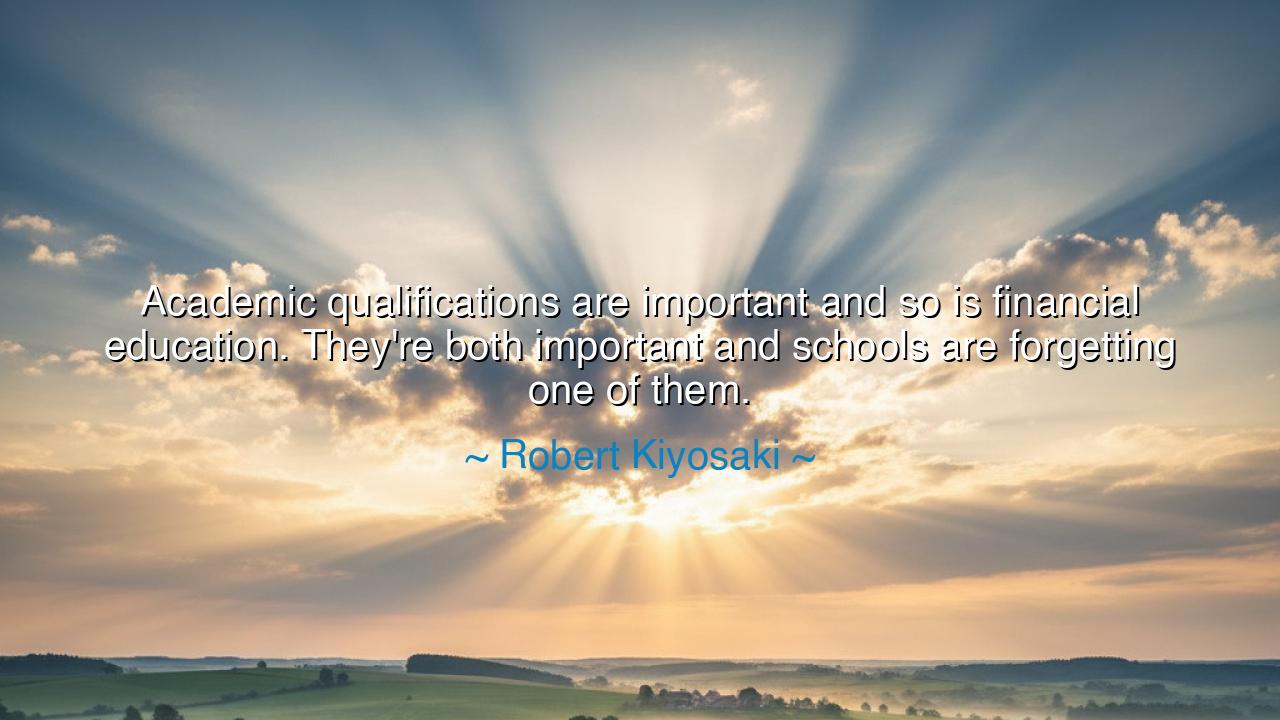
Academic qualifications are important and so is financial
Academic qualifications are important and so is financial education. They're both important and schools are forgetting one of them.






“Academic qualifications are important and so is financial education. They're both important and schools are forgetting one of them.” Thus declared Robert Kiyosaki, the teacher of wealth and author of Rich Dad, Poor Dad, whose words have stirred millions to reconsider what it truly means to be educated. His wisdom is not spoken from the ivory towers of universities but from the marketplace, where lives rise or crumble not by degrees alone, but by knowledge of how to master money. For Kiyosaki saw what many refuse to see: that while academic qualifications open doors, it is financial education that keeps those doors from closing.
In these words is revealed a great imbalance. Society praises the scholar who earns high grades, who secures diplomas and certificates, yet it neglects to prepare him for the storms of financial life. He may know how to solve equations or recite history, yet he may not know how to manage debt, invest wisely, or build wealth that endures. Thus Kiyosaki warns: schools honor one kind of knowledge, but forget the other, and in this forgetting they leave their students vulnerable. For what good is knowledge of the stars if one cannot manage the bread upon the table? What good is mastery of theories if one is enslaved by poverty and debt?
The ancients themselves understood the balance. The philosophers of Greece sought truth and virtue, but the merchants of Phoenicia taught the art of trade, the counting of coins, and the building of wealth that sustained empires. The wise ruler was not only learned in law but skilled in treasury. For nations fall not only for lack of soldiers, but for lack of wisdom in wealth. Kiyosaki’s cry is thus a modern echo of an ancient truth: knowledge must dwell both in the mind and in the marketplace, or it is incomplete.
History bears witness through the story of the Great Depression. In the 1930s, countless men and women with education and skill found themselves destitute, not because they lacked intelligence, but because they had never been taught to navigate the perilous tides of finance. Banks collapsed, savings vanished, and families that had labored for decades were left with nothing. The tragedy was not only economic but educational: the people had learned much, but not the one thing that might have saved them—financial wisdom.
So too in our own age. A young graduate may step proudly into the world with a diploma in hand, yet burdened by mountains of debt. She may find work, but if she does not understand how to save, how to invest, how to guard herself against waste, she remains bound, her future mortgaged to ignorance. Meanwhile, another who lacked formal degrees but who learned the ways of money may build freedom, wealth, and even employ those with greater qualifications. This contrast, which Kiyosaki himself observed in his own life, is the very reason for his warning: schools honor academic qualifications but neglect financial education, and thus they fail to prepare their children for the fullness of life.
What lesson must we draw from this? It is not to despise academic learning, for it is noble and necessary. But neither must we neglect the knowledge that sustains life’s foundations. Parents, teach your children not only to read and write, but also to save and spend wisely. Teachers, weave lessons of money and responsibility alongside mathematics and literature. Students, seek wisdom not only in the classroom, but also in the realm of finance, where choices made early echo across decades. For the union of the two—academic knowledge and financial wisdom—creates the fullness of true education.
So let us carry Kiyosaki’s words as a guiding principle: “Academic qualifications are important and so is financial education. They’re both important and schools are forgetting one of them.” Do not be content with half of wisdom when the whole is within reach. Strive for balance, for a mind trained in knowledge and a spirit trained in discipline, for in this harmony lies both freedom and greatness. And remember always: the truest education is not that which ends with examinations, but that which endures in every decision, every coin spent, and every legacy left for those who follow.






AAdministratorAdministrator
Welcome, honored guests. Please leave a comment, we will respond soon